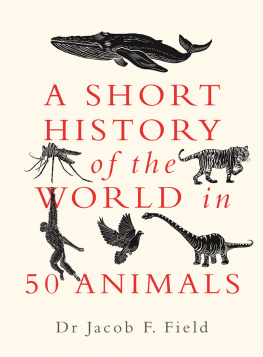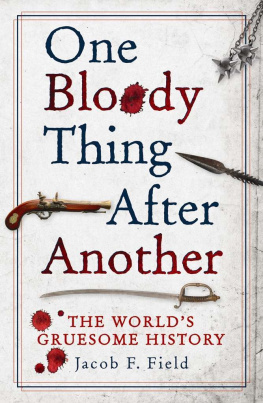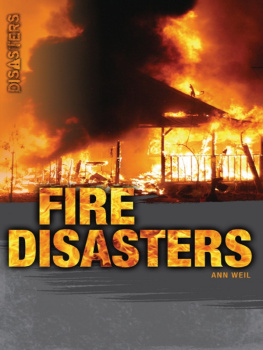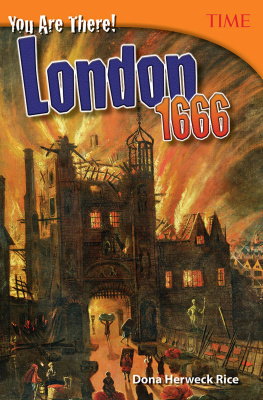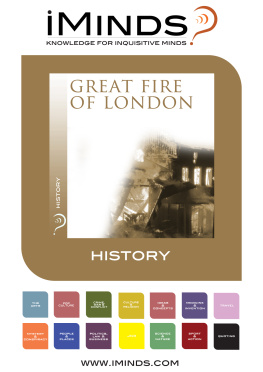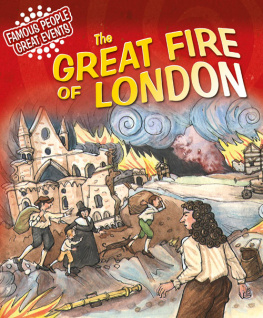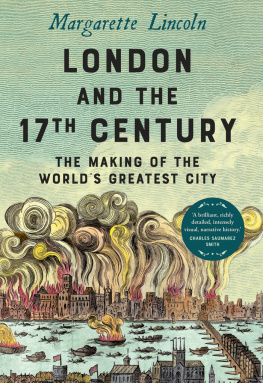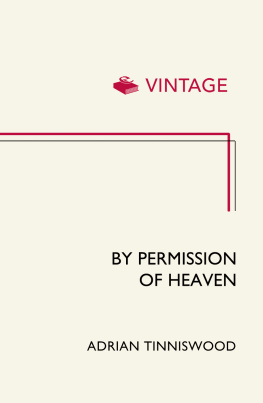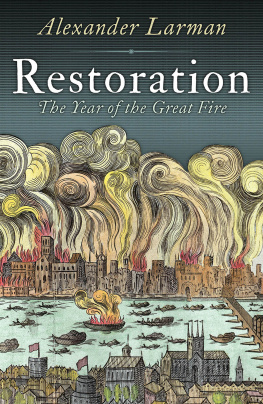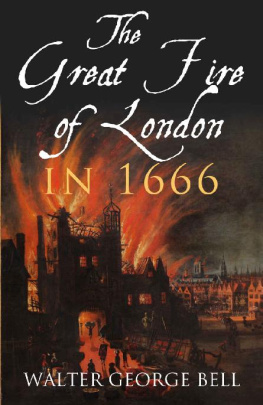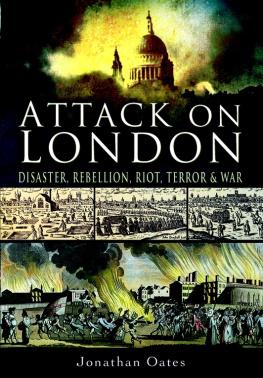London, Londoners and the Great Fire of 1666
The Great Fire of 1666 was one of the greatest catastrophes to befall London in its long history. While its impact on London and its built environment has been studied and documented, its impact on Londoners has been overlooked. This book makes full and systematic use of the wealth of manuscript sources that illustrate social, economic and cultural change in seventeenth-century London to examine the impact of the Fire in terms of how individuals and communities reacted and responded to it, and to put the response to the Fire in the context of existing trends in early modern England. The book also explores the broader effects of the Fire in the rest of the country, as well as how the Great Fire continued to be an important polemical tool into the eighteenth century.
Jacob F. Field has taught history at Massey University and the University of Waikato, New Zealand. He is currently a research associate at the University of Cambridge.
Routledge Research in Early Modern History
For a full list of titles in this series, please visit www.routledge.com
The Business of the Roman Inquisition in the Early Modern Era
Germano Maifreda
Cities and Solidarities
Urban Communities in Pre-Modern Europe
Edited by Justin Colson and Arie van Steensel
James VI and Noble Power in Scotland 15781603
Edited by Miles Kerr-Peterson and Steven J. Reid
Conversion and Islam in the Early Modern Mediterranean
The Lure of the Other
Edited by Claire Norton
Plural Pasts
Power, Identity and the Ottoman Sieges of Nagykanizsa Castle
Claire Norton
Witchcraft, the Devil, and Emotions in Early Modern England
Charlotte-Rose Millar
Early Professional Women in Northern Europe, c. 16501850
Edited by Johanna Ilmakunnas, Marjatta Rahikainen, and Kirsi Vainio-Korhonen
The Solemn League and Covenant of the Three Kingdoms and the Cromwellian Union, 16431663
Kirsteen M. MacKenzie
London, Londoners and the Great Fire of 1666
Disaster and Recovery
Jacob F. Field
First published 2018
by Routledge
2 Park Square, Milton Park, Abingdon, Oxon OX14 4RN
and by Routledge
711 Third Avenue, New York, NY 10017
Routledge is an imprint of the Taylor & Francis Group, an informa business
2018 Jacob F. Field
The right of Jacob F. Field to be identified as author of this work has been asserted in accordance with sections 77 and 78 of the Copyright, Designs and Patents Act 1988.
All rights reserved. No part of this book may be reprinted or reproduced or utilised in any form or by any electronic, mechanical, or other means, now known or hereafter invented, including photocopying and recording, or in any information storage or retrieval system, without permission in writing from the publishers.
Trademark notice: Product or corporate names may be trademarks or registered trademarks, and are used only for identification and explanation without intent to infringe.
British Library Cataloguing-in-Publication Data
A catalogue record for this book is available from the British Library
Library of Congress Cataloging-in-Publication Data
Names: Field, Jacob, author.
Title: London, Londoners and the Great Fire of 1666 : disaster and
recovery / by Jacob F. Field.
Description: New York : Routledge, 2018. | Series: Routledge
research in early modern history | Includes bibliographical
references and index.
Identifiers: LCCN 2017028242 (print) | LCCN 2017028721 (ebook) |
ISBN 9781315099323 (ebook) | ISBN 9781138207141 (hardback :
alkaline paper)
Subjects: LCSH: Great Fire, London, England, 1666. | FiresSocial
aspectsEnglandLondonHistory17th century. | DisastersSocial
aspectsEnglandLondonHistory17th century. | Disaster
reliefEnglandLondonHistory17th century. | Urban
renewalEnglandLondonHistory17th century. | London
(England)History17th century. | London (England)Social
conditions17th century. | London (England)Economic
conditions17th century.
Classification: LCC DA681 (ebook) | LCC DA681 .F54 2018 (print) |
DDC 942.1/2066dc23
LC record available at https://lccn.loc.gov/2017028242
ISBN: 978-1-138-20714-1 (hbk)
ISBN: 978-1-315-09932-3 (ebk)
Typeset in Sabon
by Apex CoVantage, LLC
Without the support of my family, friends and colleagues, the researching and writing of this book would have been impossible. Firstly I would like to thank my parents, Ellen and Paul, who have unconditionally supported and inspired me. I owe them more than I can express. To my late sister, Eowyn Jane, I miss you every day. I would also like to thank my parents partners, Ian and Pam, as well as the rest of my family from across the world, especially my grandparents Grandma Billie and the late Albert Cretella, Aussie Granddad and Nana. Finally I must thank my wife Emily, who makes me feel lucky every day and never stopped believing in me; I will always be thankful for this and for her. I would also like to thank my in-laws, the Bell family, for welcoming me so warmly into their midst.
My friends have kept me from getting too lost in the seventeenth century through their good company and encouragement in the twenty-first. I would like to thank my second families: the Tomiczeks (Caroline, Isaac and Safiya) and the Blitzes (Biggi, Barry, Jonas and David), as well as the Greenwalds (Ava Seave, Bruce and Diana), who have provided generous support throughout my academic life, and Mark Ravenhill. I would also like to thank: James, Samir, Ali and Al; the Greens (especially my goddaughter Isabel); Niheer, Dan, Rich, Tina, Neil, Jillian, Chris, Laura, Josh and the Heortons; and Elly, Corin, Toby, Pete, Alli and Ellie.
This book could not have been undertaken without the help of the people who care for the records it depends upon. I have relied heavily on the help and advice of those who work at the Guildhall Library, the London Metropolitan Archives and the National Archives. I have also used the resources of the Robinson Library at Newcastle, the British Library, the London Library and the Wellcome Library.
My greatest academic debt is to my doctoral supervisor at Newcastle University, Jeremy Boulton, who has been a constant source of knowledge and constructive criticism, and whose expertise and assiduousness has been invaluable. I would also like to thank my second supervisor Helen Berry. This book has benefited greatly from the input of the two examiners of the doctoral thesis upon which it was based: Ian Archer and Rachel Hammersley. My colleagues during my postdoctoral work at the University of Cambridge have also been incredibly helpful and stimulating in particular Amy Erickson, Gill Newton, Max Satchell, Leigh Shaw-Taylor and Tony Wrigley. I have also been blessed with wonderful support from my colleagues at Massey and Waikato universities, especially Michael Belgrave, James Beattie, Peter Lineham and Rowland Weston. I am also grateful for conversations, correspondence and advice with many other historians over the years, including Sylvia Brown, Ian Doolittle, Vanessa Harding, Philippa Hubbard, John Landers, David Marsh, Joseph Monteyne, Osamu Saito, Chiaki Yamamoto and Matthew Yeo. I would also like to thank the two anonymous peer reviewers of this book for their perceptive and constructive comments, as well as the editorial team at Routledge.


